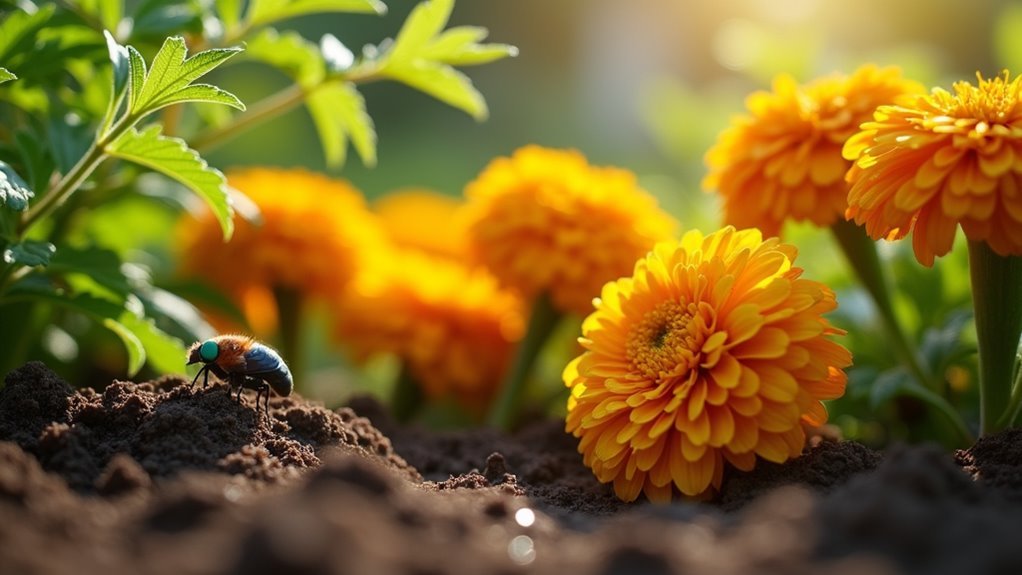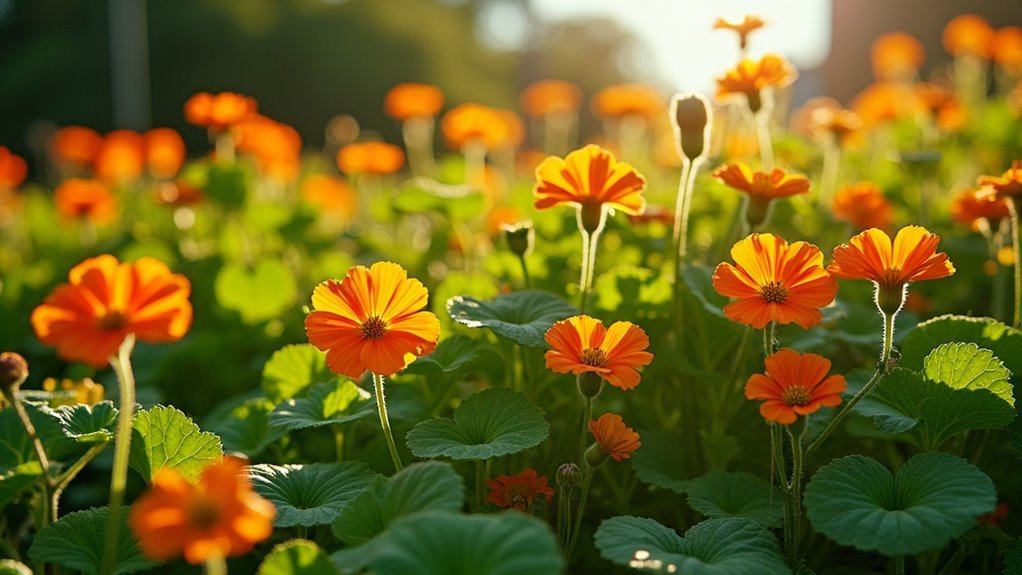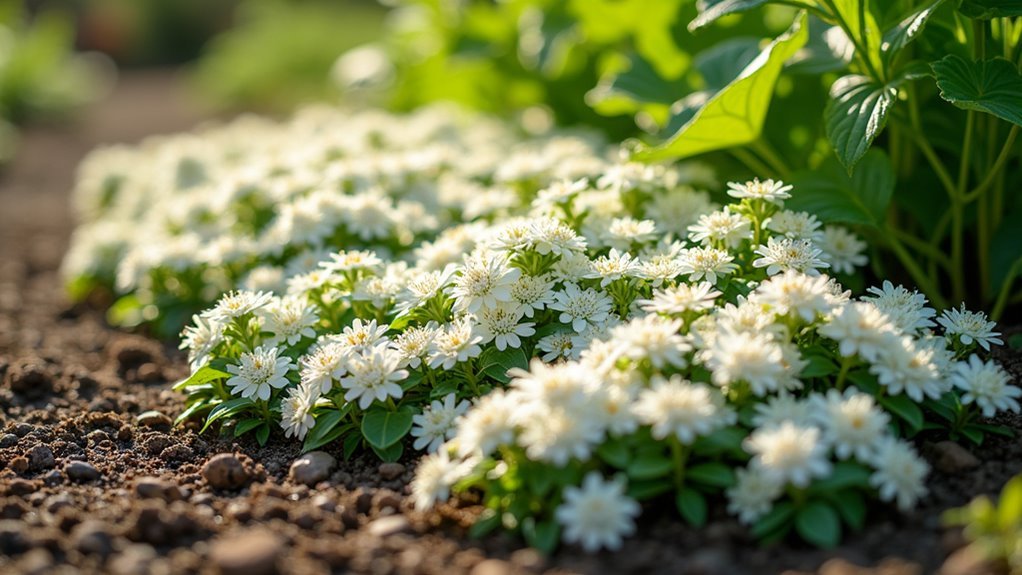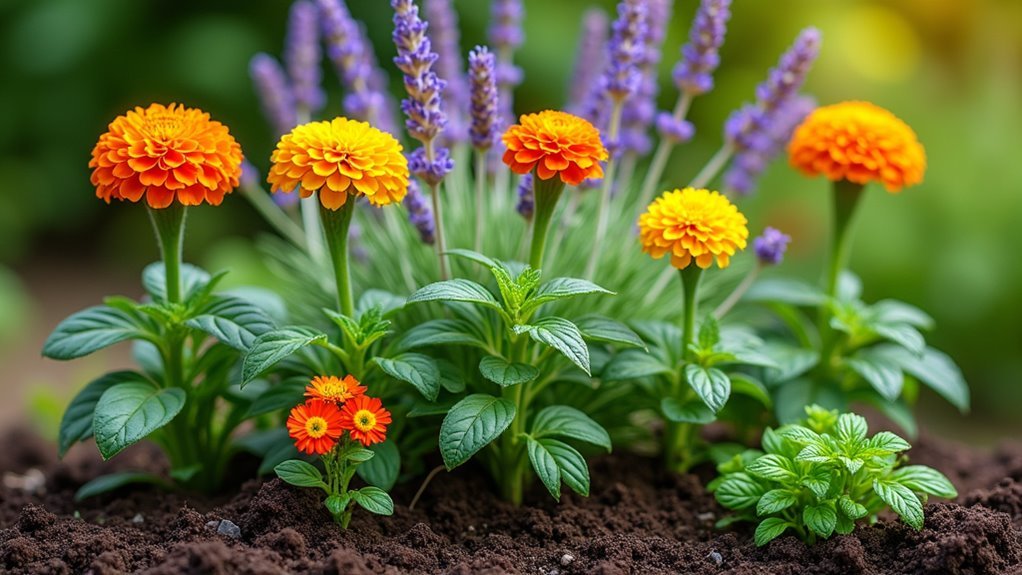You can protect your garden naturally by planting five powerful companion plants that repel harmful pests. Marigolds deter nematodes and aphids with their distinctive scent, while alliums like garlic and chives repel beetles. Nasturtiums act as trap crops, luring pests away from valuable vegetables. Basil’s aromatic compounds ward off flies and whiteflies, particularly when planted near tomatoes. Sweet alyssum attracts beneficial predator insects that hunt garden pests. These strategic plantings will reveal even more pest-fighting secrets for your garden.
Marigolds: Natural Deterrents for Multiple Garden Pests

While many gardeners struggle with persistent pest problems, marigolds offer a simple yet powerful solution that’s been trusted for generations. These vibrant flowers repel garden pests like nematodes, aphids, and whiteflies through their distinctive scent, which can confuse pests and mask nearby plants’ odors.
Marigolds provide generations-tested pest control through their distinctive scent that confuses harmful insects and masks vulnerable plants.
You’ll find planting marigolds alongside tomatoes and peppers dramatically reduces pest infestations while boosting plant health.
What makes marigolds exceptional for pest management isn’t just their repelling abilities—they also attract beneficial insects like ladybugs and lacewings that hunt harmful pests.
You can easily grow these hardy companions in various soil types throughout vegetable gardens. They’ll bloom continuously from spring until frost, providing season-long protection that enhances your garden’s natural defense system.
Alliums: Sulfur-Scented Protection Against Beetles and Aphids
When you’re looking for powerful pest protection that goes beyond flowers, alliums deliver sulfur-scented defense that beetles and aphids can’t tolerate.
These versatile companion plants include chives, onions, leeks, scallions, and garlic, all emitting distinctive fragrances that effectively repel common garden pests.
You’ll create a natural pest barrier by strategically planting alliums around vulnerable crops. Their strong scent masks neighboring plants’ odors, making it harder for pests to locate host plants.
When alliums flower, they’ll attract beneficial insects while continuing their protective role.
These adaptable plants thrive in vegetable rows and flower beds, enhancing both pest control and garden aesthetics.
Nasturtiums: Trap Crops That Lure Pests Away From Valuable Plants

Nasturtiums offer a clever alternative to repelling pests—they actually attract them away from your prized vegetables.
These vibrant trap crops work by drawing aphids and other harmful insects to themselves, serving as sacrificial decoys that protect your valuable plants nearby.
You’ll appreciate how nasturtiums enhance biodiversity while functioning as effective companion plants alongside tomatoes and cucumbers.
Their colorful edible flowers and peppery leaves add culinary value to your garden, making them dual-purpose plants.
These resilient beauties thrive in poor soil conditions and tolerate full sun to partial shade, requiring minimal care.
Basil: Aromatic Defense Against Flies and Whiteflies
Although nasturtiums work through attraction, basil takes the opposite approach by actively repelling unwanted insects with its powerful aromatic compounds.
This fragrant herb effectively deters flies, mosquitoes, and whiteflies from your garden while serving as one of the most versatile companion plants available.
Basil’s strong scent masks nearby vegetables’ natural odors, making it difficult for pests to locate their target plants. You’ll find it particularly effective when planted alongside tomatoes and peppers.
Beyond pest control, basil attracts beneficial insects like bees and butterflies, promoting pollination and overall garden health.
For ideal results, plant basil in full sun with well-drained, fertile soil.
This aromatic powerhouse will enhance both your vegetables’ flavor and their natural defenses against common garden pests.
Sweet Alyssum: Ground Cover That Attracts Beneficial Predator Insects

Sweet Alyssum transforms your garden into a bustling ecosystem by attracting an army of beneficial predator insects that naturally control pest populations. This versatile ground cover produces tiny, fragrant flowers that bloom continuously from spring to fall, providing abundant nectar for hoverflies and parasitic wasps.
These beneficial insects actively hunt garden pests, creating effective organic pest control without chemicals.
You’ll appreciate how Sweet Alyssum serves multiple functions beyond pest management. It acts as living mulch, suppressing weeds while retaining soil moisture around your plants.
The continuous blooms attract pollinators, enhancing biodiversity throughout your garden. This adaptable plant thrives in various soil types and lighting conditions, making it perfect for companion planting among vegetables and flowers where natural pest management matters most.
Frequently Asked Questions
What Companion Plants Keep Pests Away?
You’ll want basil near tomatoes to repel aphids and hornworms. Plant marigolds to deter nematodes, chives around carrots for pest control, nasturtiums as trap crops, and catnip for mosquito protection.
What Plant Repels Bugs in the Garden?
You’ll find marigolds work exceptionally well at repelling garden bugs with their strong scent that deters nematodes, mosquitoes, and cabbage worms while attracting beneficial insects like ladybugs to your garden.
What Is the Best Deterrent for Garden Pests?
You’ll find integrated companion planting works best for pest control. Combine strongly scented herbs like basil and rosemary with trap crops like nasturtiums, while adding alliums and beneficial-attracting flowers to create a balanced, pest-resistant garden ecosystem.
What Plant Works as a Natural Pest Control?
You’ll find marigolds work exceptionally well as natural pest control. They emit strong fragrances that repel nematodes and various garden pests, making them ideal companion plants for protecting tomatoes and peppers from harmful insects.
In Summary
You’ll find these five companion plants create a natural defense system in your garden without relying on harsh chemicals. Plant marigolds, alliums, nasturtiums, basil, and sweet alyssum strategically throughout your beds to repel unwanted pests while attracting beneficial insects. They’re easy to grow, beautiful additions that’ll work around the clock protecting your vegetables and flowers. Start incorporating these pest-fighting companions into your garden plan for healthier, more productive growing seasons.





Leave a Reply